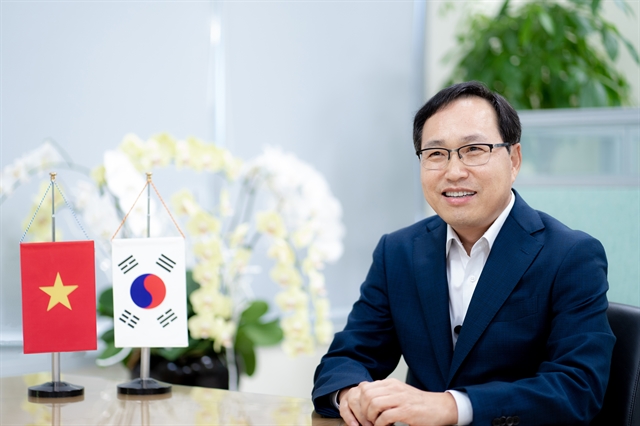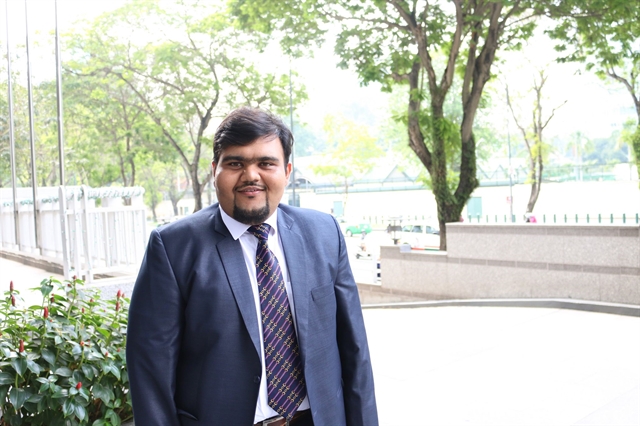 Economy
Economy

The fourth outbreak of the COVID-19 pandemic starting from late April has had more negative impacts on daily life as well as socio-economic development than the previous waves in the country. However, Viet Nam attracted US$14 billion in foreign direct investment (FDI) in the first eight months of this year, only 2 per cent lower than the same period last year, showing foreign investors’ confidence in the country’s economic scenario in the mid-and long terms.
The fourth outbreak of the COVID-19 pandemic starting from late April has had more negative impacts on daily life as well as socio-economic development than the previous waves in the country. However, Việt Nam attracted US$14 billion in foreign direct investment (FDI) in the first eight months of this year, only two per cent lower than the same period last year, showing foreign investors’ confidence in the country’s economic scenario in the mid-and long terms.
Việt Nam News reporters Vũ Hoa and Hoàng Anh talk with Choi Joo Ho, President of Samsung Vietnam; Mohammad Mudasser, Director, Advisory Services, PwC Vietnam; and Nguyễn Thị Ngọc Huệ, Corporate Communications & External Affairs General Manager of AEON Vietnam about investors’ confidence in Việt Nam’s investment environment and its fight against the pandemic.
How has the fourth outbreak of the coronavirus in Việt Nam and the ongoing social distancing measures including restrictions on mobility and disrupted supply chains affected your firm's operations?

|
| Choi Joo Ho, President of Samsung Vietnam |
Choi Joo Ho, President of Samsung Vietnam
When the 4th wave of the COVID-19 pandemic hit Bắc Ninh and Bắc Giang, in May and June, Samsung had difficulties in production, but with the comprehensive support of Prime Minister Phạm Minh Chính, the Government, and local authorities, as well as effective anti-pandemic measures, Samsung has overcome these obstacles.
However, recently, due to the COVID-19 pandemic situation in HCM City, our production and supply of TVs and home appliances encountered difficulties. If this situation continues, which is expected to cause major problems for exports, we hope that economic activities will be restored soon so that Samsung factories and our suppliers can return to normal operation.
Despite the COVID-19 pandemic, Samsung has successfully achieved its export target in the first six months of the year. If Samsung's home appliance factory in HCM City returns to normal operation, we are expected to exceed this year's export target.

Mohammad Mudasser, Director, Advisory Services, PwC Vietnam
The impact of the fourth outbreak and the ongoing social distancing measures vary depending on the industry you operate in. Like all others in the professional services sector, PwC Vietnam has operated fully on a work-from-home basis in accordance with the Vietnamese Government’s and health authorities’ guidance.
In my opinion, business-as-usual has been redefined and physical presence at work is no longer a “must-have”. Embracing Digitalisation is key in how professional services firms today serve and respond to clients’ needs. From the daily virtual client meetings to the use of AI/analytics for workforce predictions.
Whilst these are challenging times for all businesses in Việt Nam, the outbreak also presents an opportunity for organisations to evaluate their capabilities based on the fast-changing market conditions and client behaviours. That’s why it is encouraging to see that many companies are looking “inwards” for business improvement initiatives (eg. restructuring, cash and cost management, employee wellbeing and embedding higher levels of professionalisation of the business).

|
| Nguyễn Thị Ngọc Huệ, Corporate Communications & External Affairs General Manager of AEON Vietnam |
Nguyễn Thị Ngọc Huệ, Corporate Communications & External Affairs General Manager of AEON Vietnam
The outbreak has resulted in negative and challenging impacts on the socio-economic situation and changed customers’ shopping behaviour. Those are difficulties that all businesses, including AEON Vietnam, had to cope with. For example, we have experienced a shortage of workers on daily operations due to employees infected with COVID-19 or living in quarantine zones and a shortage of shippers.
Costs have also been on the rise due to pandemic prevention activities such as regular store disinfection and COVID-19 tests. Meanwhile, during some peak periods AEON Vietnam has reduced its profit margin to support suppliers with the cost burden and at the same time keep prices stable for customers.
AEON Vietnam's policy not to charge/reduce rental costs for tenants in shopping malls partly affects the revenue composition of the whole company.
Our shippers experienced difficulty in inter-district delivery due to inconsistent procedures at checkpoints in the green zones in the city even though the employees or the suppliers present the staff IDs or certificates.
Do you see the Vietnamese Government's effort to contain the spread of the virus as too restrictive or appropriate? Please elaborate why?
Choi Joo Ho
We completely agree with the Vietnamese Government's policy of "effective pandemic prevention" and "economic growth" at the same time.
Strict prevention measures to control the pandemic are inevitable. However, when strong pandemic prevention measures continue for a long time, it will cause vital economic losses. I think that both pursuing "effective pandemic prevention" and "economic growth" must constantly examine that balance.
Especially, after the pandemic situations in Bắc Giang and Bắc Ninh were controlled, I completely believe in the pandemic prevention and control solutions from the Government and Prime Minister Chính. I have faith that the pandemic situation, including the outbreak in HCM City, will soon be stabilised. We will do our best to contribute to the rapid economic recovery of Việt Nam.
Mohammad Mudasser
Closing the border and containing the spread at the border proved to be the most effective measure made by the Vietnamese Government when the first outbreak started in early 2020.
With the emergence of new variants, efforts to contain the spread have become much more challenging. Thus it is important for the government to focus and continue to implement actionable initiatives on how to adapt and live with COVID-19 (e.g. COVID-19 vaccine fund) while promoting socio-economic development (eg. Resolution 68/NQ-CP supporting employees and employers).
Nguyễn Thị Ngọc Huệ
Facing many difficulties caused by the pandemic, efforts and measures of the government are unprecedented. Because the socio-economic conditions and the pandemic situations in Việt Nam have their own characteristics that cannot be compared with those in other countries, the government and authorities had adjusted the countermeasures in a flexible and timely manner.
We understand the Vietnamese government's countermeasures are necessary to fight the pandemic. Despite the difficulties, AEON always supports and stands along with the Vietnamese government and the Vietnamese people. We have seen that the government also received great support from the public.
Through AEON retail operations, we always strive to stabilise the supply and selling price of essential goods for people; supporting suppliers in Green Lane registration to remove difficulties in good transportation and distribution.
What recommendations would you make to the Vietnamese Government on how to fight the virus while mitigating the disruption to the country's supply chain? What does Việt Nam need to do to attract more foreign investors in the current context, thereby creating momentum for economic recovery in the post-COVID period?
Choi Joo Ho
Maintaining the global supply network of industrial parks is extremely important for businesses operating manufacturing plants, so we hope that the Government can share the problem with us. In any circumstances, there should be a mechanism to ensure "uninterrupted production". That is, we would like to suggest that even in difficult circumstances, the production lines of factories will not stop working, still operate according to the standard guidelines and predetermined route.
We know that recently, the four provinces of Bắc Ninh, Thái Nguyên, Bắc Giang and Vĩnh Phúc, where global IT businesses are mainly involved in the supply chain, will soon sign a Memorandum of Understanding to build an ecosystem that supports businesses. The main content is to develop standard principles related to the prevention of the COVID-19 pandemic, to facilitate the movement of people and goods, as well as policies to minimise damage caused by factory closures without any notice in advance.
If this Memorandum of Understanding is signed and implemented according to the content, even if unexpected situations like COVID-19 occur, businesses in the four provinces can still produce without interruption.
Mohammad Mudasser
While the government has issued different support packages, accessibility to these support has not been easy despite 86 per cent of Vietnamese enterprises - in a recent Việt Nam Chamber of Commerce and Industry (VCCI) survey - stating that the relief policies are useful for their businesses and operations.
To ensure prompt implementation, previously issued government initiatives, such as delay in payments of tax and interest, reduction in interest rates, other subsidies, etc. need to be constantly communicated to relevant stakeholders (e.g. banks, state tax offices, etc.). With small-and-medium enterprises (SMEs) making up over 90 per cent of total enterprises in the country, support packages SMEs in specific industries will also help kick-start the recovery of some essential supply chains.
In order for Việt Nam to achieve its goal of safely co-existing with COVID-19, the government needs to expedite the sourcing of vaccines through different channels (e.g. via COVID-19 fund under Decision Dec779/QĐ-TTg, COVAX). Concurrent to hastening the vaccination drives, social vigilance and strict enforcement of existing medical protocols such as 5K is needed to minimise further community outbreaks.
Nguyễn Thị Ngọc Huệ
In order to join hands with the government in economic recovery and to contribute to the dual goals of fighting the virus and socio-economic development, our recommendations are as follows.
We recommend full vaccination for workers in the retail sector as they are among the most vulnerable groups during the pandemic.
We support the implementation of vaccine passports, shorten quarantine time and simplified procedures for foreign experts entering Việt Nam. More autonomy should be given to businesses in their own virus countermeasures when infections were detected and to decide whether they should continue or stop business operations.
We also support capital support for small-and-medium-sized enterprises in the short and long term and the implementation of cashless payment.
We urge government agencies to streamline and simplify customs and importing procedures to speed up the import/export process, especially once the virus has been put under control to meet market demand.
What does Việt Nam need to do to attract more foreign investors in the current context, thereby creating momentum for economic recovery in the post-COVID period?
Choi Joo Ho
Although the COVID-19 pandemic is causing negative impacts, in the long term Việt Nam is still an attractive investment destination for foreign investors.
In particular, the Prime Minister approved a new strategy (No 105) and redirected pandemic prevention, which is good news for foreign investors.
In the future, if Việt Nam continues to implement effective anti-pandemic measures, and at the same time strengthens and creates favourable conditions for the recovery, maintenance, development of production, business and circulation of goods in a smooth way, overcoming supply chain disruptions, it is expected to continue to attract foreign investors to Việt Nam.
Mohammad Mudasser
FDI disbursement for August 2021 was two per cent higher than August 2020. This shows that overall sentiment is still buoyant for the Việt Nam story. Việt Nam needs to continue to showcase that the country has effective management regarding the balance between economic recovery and disease control across state, city and municipality levels.
Although incentive schemes to attract foreign capital investment are valuable, investors are also looking to see the results of Việt Nam's effort in preserving social welfare while reviving the economy. This phased approach must be backed by clear government guidance and strict enforcement mechanisms. — VNS




